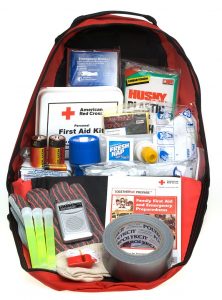As FEMA recommends, a family should have a "go-kit" for an emergency, make a plan, and stay informed.
By Meghan McPherson, MPP, CEM
Assistant Director, Center for Health Innovation, Adjunct Faculty, Emergency Management Graduate Programs
As emergency managers, we are always asked what a family should have in their “go-kit” for an emergency. Families should always have the basics on hand. We may not know exactly what will happen at any given time, but you should make sure that you and your family can sustain themselves for at least 72 hours if you had to evacuate, as well as sheltering in place (staying in the house together for safety). With that type of planning, your family will be ready for all levels of emergencies.
As FEMA recommends, a family should have a kit, make a plan, and stay informed. As your family begins to plan, make sure to include a way to cover all three of those elements.
Remember to include plans and supplies for everyone in your family, including the pets. Replace the items in your kit as you do with the batteries in your smoke detector. When the clocks change, check the items in your emergency kit to make sure everything it up to date and nothing needs to be replaced. Better to get your new supplies now before there is a run on them in the stores right before or after an event!
 Basic “Go-Kits” should include:
Basic “Go-Kits” should include:
- First-aid kits
- Emergency supplies – plastic gloves, bags, Lysol wipes, flashlights, toilet paper, batteries, face mask, plastic glasses
- Set of basic tools (turning off water, gas, etc)
- Minimum three-day supply of nonperishable food and water at home (1 gallon/per person/per day) and don’t forget pets in your food/water supply
- Weather Radio: They now have batteries, cranks, solar panels. Many will charge your phones as well.
- Activities for young kids
- Copies of key documents in a plastic bag
It is also important to make sure that you have the following information associated with your family’s medical care:
- Names
- Contact information
- What they treat
- What medications they prescribe for you
Know your insurance company:
- which company covers what part of your life
- how to contact them
- policy numbers
Know your medications:
- WHAT you take
- WHEN you take it
- WHY you take it
- WHAT is the name and number of your pharmacy
By taking the steps outlined above, you can make a real difference in the preparedness of your family should a disaster or emergency strike!
For further information, please contact:
Health and Wellness Committee
e – healthandwellness@adelphi.edu